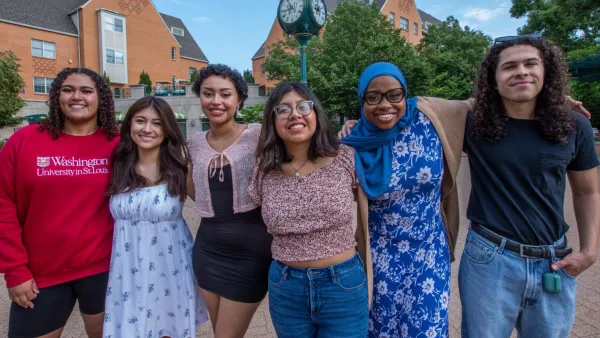Graduate students in political science have recently seen remarkable outcomes on the academic job market, earning multiple interviews and offers and accepting excellent placements. One key to the success of the highly ranked graduate program is a team-based approach to mentoring and navigating the job market.
Last year, the Department of Political Science achieved extraordinary outcomes in job placements for graduate students. Though the academic job market is notoriously tough, the six political science students on the market during the 2021-22 job season collectively earned 30 interviews, resulting in 17 offers. All ultimately secured excellent placements. Four accepted tenure-track assistant professorships at distinguished institutions including Loyola, NYU, UCLA, and UT-Austin, and two captured research positions at well-respected centers.
Successful graduate placements contribute to the program’s excellent national reputation and high ranking by U.S. News & World Report. In 2021, U.S. News ranked WashU’s political science graduate program 12th overall, and its political methodology, American politics, comparative politics, and international relations subfields ranked 8th, 15th, 18th, and 26th respectively. WashU moved up in the overall rankings more than any other top 20 department. This was also the first time the newly rebuilt international relations subfield had ever been nationally ranked.
Margit Tavits, the William Taussig Professor in Arts & Sciences and chair of the political science department, credits an “all hands on deck” approach and the dedicated efforts of both students and faculty as instrumental to the success of the political science graduate program.
“Our job placements this year have been truly outstanding and reflect the strength of our PhD program,” Tavits said. “Advisors are important, but our program is also very much a ‘all hands on deck’ type of operation, both in terms of training and placement. We don’t use a lab-based model. Instead, all faculty members are fully informed about who is on the market, what they study, where they interview, and will use their contacts and networks to help with the placement effort.”
“Our entire faculty takes pride in – and advocates for – the success of all of our students,” added Jacob Montgomery, associate professor and chair of the political science track for computational and data sciences, who served on the dissertation committees of four students who were on the job market this year.

During the 2021-22 job season, two students received a particularly large number of interviews and offers. Bryant Moy, who specializes in American politics – one of political science’s top subfields – and whose dissertation committee is chaired by Montgomery, received nine interviews and five offers for tenure-track positions. Moy accepted an assistant professorship at NYU.
Luwei Ying, who specializes in international relations with dissertation chair David Carter, received 14 tenure-track interview requests – so many that she had to decline five. Ying ultimately completed nine interviews at institutions including Princeton, Michigan, and UCLA; received seven offers; and accepted a position as an assistant professor at UCLA. This is a remarkable set of achievements for Ying and the department, especially given that she is the first international relations job candidate since the department rebuilt this subfield starting in 2016.

Results like these speak to the incredible efficacy of the Department of Political Science’s unique approach to graduate training, mentorship, and job placement.
In many disciplines, students are either admitted directly into research labs or quickly affiliate with a single faculty mentor shortly after their arrival in a program. WashU’s political science department favors a more open-ended approach in which students choose their advisors later and are encouraged to work with and seek advice from faculty members who are not on their dissertation committee or even in their subfield. This more flexible model allows students to benefit from training by the department as a whole.
“WashU stands out in that it combines world-class expertise in important substantive problems in politics with strong methodological training. Thus, students are exposed to a wide range of cutting-edge and emerging research literatures, while being simultaneously armed with the tools to do analysis that is both theoretically and empirically innovative,” noted Carter, associate professor and director of graduate studies in political science. “The collaborative research environment at WashU also plays an important role in our program’s success, as we start actively advising students on their own research project during their second year. The intended outcome of this ‘third year paper’ is a peer-reviewed journal article.”
It is standard practice in the Department of Political Science for faculty and graduate students to work as peer collaborators on projects. This allows graduate students to gain valuable experience as coauthors of more seasoned scholars while amassing publications that will boost their outcomes on the academic job market.
“The academic job market is incredibly competitive. To stand out, students need to be doing research that is substantively interesting, theoretically rigorous, and empirically sophisticated,” Montgomery said. “When students have the opportunity to work with faculty with a variety of specializations, it helps them build the kind of strong toolkit people want to hire. Because of how we are set up, when departments are looking at applicants from WashU Political Science they know they are going to be well trained and ready to engage in cutting-edge research from day one.”




